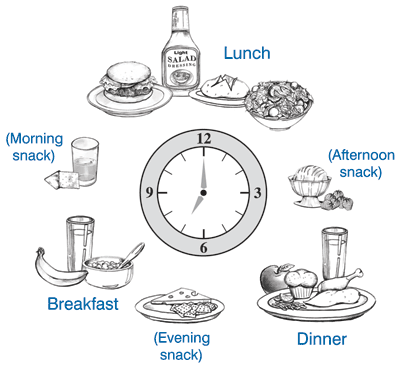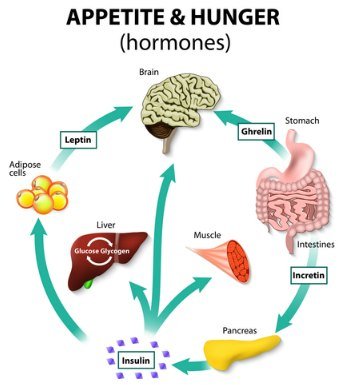Intermittent Fasting for Weight Loss – Beginner’s Guide
Using intermittent fasting for weight loss is a powerful and effective strategy. Let’s talk about how it works and why it’s so effective.
When a lot of people hear the word “fasting,” alarm bells go off in their heads and they immediately think of starvation. Things like putting your body into starvation mode and impacts on metabolism.
Fasting is not starvation — although I suppose when it lasts for more than a day or two, you could make that argument. Some people do fasts for 5 days, 10 days, and even 30 days.
But that’s not what we’re talking about here.
Today, we’re doing about intermittent fasting. It’s totally healthy, safe, and it doesn’t last for more than 24 hours. So no, you will not starve to death.
Here is what will be covered:
- What is intermittent fasting?
- Why people are confused by it
- 5 Reasons to use intermittent fasting for weight loss
- What to watch out for
- A simple protocol you can implement
Let’s get started…
This post may contain affiliate links, which helps keep this content free. Please read our disclosure for more info.
What is Intermittent fasting?
Intermittent fasting is simply scheduled periods of time without eating. There are two main variations of the diet popularized by different people:
16/8 Method
The Leangains Protocol by Martin Berkhan. This is the most popular fasting method.
This is where you fast for 16 hours of the day and only eat during the other 8 hours.
It sounds scarier than it is. I promise.
What most people (including myself) do is simply skip one meal and keep my other two meals within the 8-hour window. So if I ate dinner last night at 7 pm, I wouldn’t eat my next meal until 11 am.
During this time, you can still drink black coffee, tea, or water because they don’t have any calories. And no, zero-calorie coke or any other artificial sweetener is not acceptable.
24-Hour Method
The Eat Stop Eat Protocol by Brad Pilon. This is the second most popular method.
With this method, you fast for a period of 24 hours.
So, if you ate dinner at 7 pm last night, you wouldn’t eat your next meal until 7 pm the following night.
A lot of people think that this method sounds really scary because they think they have to go an entire day without eating. And while you technically do, you never have to go ‘sun-up to sun-down’ without eating, which I think is a little bit more daunting psychologically.
Why People Get Confused About Fasting

Let’s get the elephant out of the room. Here is one of the biggest misconceptions about diet and weight loss:
“Isn’t it better to eat 6 smaller meals per day to boost my metabolism? Doesn’t fasting put my body into starvation mode and make it hold on to calories?”
Nope. No. A million times NO.
There is not a single shred of evidence behind eating 6 meals per day to boost metabolism. It was a myth that was perpetuated by poorly correlated studies conducted a LONG time ago.
Here is some basic proof, because I know some of you may struggle to believe this:
- Examine.com debunks the myth of 6 meals per day for your metabolism with 36 different studies (1).
- One of the largest meta-analyses performed on eating frequency found that there is NO difference in energy expenditure between nibbling and gorging (2).
- As long as calories remained the same when two groups in these two separate studies ate different meal frequencies, there was no change in calories burned (3, 4)
The irony is that there IS scientific evidence showing that intermittent fasting (i.e. skipping a meal) can boost fat burning.
But I will say this. It depends on your body and it depends on what works for YOU.
If you find yourself overeating with only 3 meals a day, then maybe you should have 6 if it keeps your overall caloric intake down. Or if it keeps you from binge eating, absolutely!
Fasting isn’t for everyone, although we do recommend that you try it if you haven’t yet. But ultimately, listen to your body.
5 Reasons to Try Intermittent Fasting for Weight Loss
1. Improved Fat Burning and Metabolism
Intermittent fasting has been shown to boost natural metabolism by 4-13% during a fast (1, 2).
On top of that, people have also been shown to lose a significant amount of weight around the waist, getting rid of dangerous belly fat (3).
Now, it’s important to mention that while fasting can HELP this, you ultimately need to make some dietary changes as well to maximize your results here.
2. Naturally Eat Fewer Calories
The idea here is that you are skipping a meal or meals during your fasting period. The idea is NOT to eat so much food when you stop your fast that you might as well have eaten two meals anyway.
If you skip a meal or meals and then consciously consume a normal-sized portion when you stop your fast, you will naturally eat fewer calories.
People who do intermittent fasting have been shown to lose 3-8% more fat than those on standard calorie restriction diets (1).
They have also been shown to have an easier time sticking to their diets. I personally believe this one as it makes me a lot more conscious of what I do eat when my fasting period is over.
It requires discipline and that discipline often carries over into your follow-up meal (and you should let it).
3. Positively Affects Key Weight Loss Hormones

Intermittent fasting for weight loss is quite effective at optimizing hormonal responses.
- Improves insulin sensitivity – Insulin is the primary hormone secreted when people eat. By improving insulin sensitivity with fasting, you will naturally lower resting insulin levels. These lower levels of insulin facilitate fat burning (1).
- Boosts human growth hormone (HGH) – Fasting has been shown to raise HGH by 2000%, which aids in fat burning as well as muscle tissue growth (1, 2, 3).
- Normalizing leptin – Leptin is the primary weight loss hormone responsible for telling you to stop eating and to go exercise. While most people have chronically low leptin levels, leptin becomes normalized during a fast (1).
- Helps with cellular discharge – Intermittent fasting also helps the body remove waste material from the cells by improving autophagy (1).
These positive changes in the body’s hormonal environment improve weight loss speed and results.
4. Helps You Hold onto Lean Muscle
If interested in weight loss, lean muscle tissue should be important to you. This is because the more lean muscle tissue that’s on the body, the more calories the body burns at rest.
When compared to a standard calorie restriction diet, intermittent fasting has been proven to be much more effective at helping the body preserve lean muscle tissue (1).
5. Makes Life Simpler
Health and simplicity are two peas in a pod. The healthiest foods are often the simplest, like a banana or a piece of lean chicken breast.
These basic foods are some of the healthiest you can eat, and being healthy should be simple. 2-3 large healthy meals per day are much easier to manage than 6 normal-sized meals and snacks.
The more complicated a diet is, the more likely you are to expend a lot of your willpower just making decisions and trying to cut corners.
We personally prefer militant diets when it comes to serious weight loss, and that’s a huge reason why our popular weight loss program, the 21-Day Fat Loss Challenge is so effective.
Intermittent fasting eliminates more than half of the healthy decisions you must make in the day.
Okay, now that we’ve listed a few of the positives about intermittent fasting for weight loss, let’s look at some important points to pay attention to.
What to Watch Out for with Intermittent Fasting for Weight Loss
Despite the many health benefits of intermittent fasting, it’s not a cure-all and you won’t lose weight with intermittent fasting alone. You MUST pair it with a healthy diet if you want to see any results.
Keep the following in mind when you start using intermittent fasting to lose weight.
1. 99% of Snacking is a Result of Boredom — Not Hunger
One of the best things about fasting is that it makes you realize how much you mindlessly eat throughout the day — especially on a 24-hour fast.
The amount of times that you want to stop work or get up from the couch and head to the fridge or the pantry just because. Or you think about making a snack just because it’s a certain time of the day.
Eating becomes habitual. We eat because it’s the usual time or because we’re bored. Not because we’re actually hungry.
And the worst part about it is that it also makes us happy. We get a dopamine hit every time we start snacking or eat a meal. So we’re training our brain to get pleasure from it — even if we don’t need it.
Fasting helps to break this vicious cycle and make you more conscious of what and when you are eating.
2. Don’t Pig Out Because You Fasted
Calories still matter. They never stopped mattering.
It doesn’t mean that you have to or should start counting them. Quite the opposite — if you are fasting and you skip a meal, you’re reducing your total caloric intake and makes counting them less of a necessity.
But you may still get pretty hungry on your fast, so it’s really important not to use fasting as an excuse to binge.
It’s okay to eat a slightly bigger meal to re-fuel, but do not ignore calories. Make yourself a nice, balanced meal of healthy protein and fiber-rich vegetables. Maybe a small portion of healthy, complex carbohydrates on the side.
3. Give Your Body Time to Adapt
Any type of major diet or lifestyle change can require some adjustment time. Don’t try it once and give up. Give your body some time to adjust to it.
Ghrelin is the hormone that signals to you that you are hungry. If the normal M-O is eating 6 meals a day with a big breakfast, it may take a week to get used to intermittent fasting. To let your hormones catch up with what’s going on.
Your overdramatic brain may tell you that you’re starving to death and if you think about food every second of your fast, you’re going to give credibility to the drama queen.
Don’t worry. Ghrelin will adapt to the new eating style, and hunger will eventually dissipate. You’ll adjust.
How to Start Intermittent Fasting for Weight Loss
Breakfast is often the easiest meal of the day to skip, so we recommend starting there.
Try skipping breakfast and eating one meal at 11 am and one at 7 pm.
It’s okay to eat a snack in between, but do not eat earlier than 11 am or later than 7 pm. It’s okay to adjust this 8-hour window to your needs as long as your eating period remains within 8 hours.
During this fast, you can drink the following:
- Black coffee
- Tea (no cream or sugar)
- Water (try adding some apple cider vinegar — it helps to suppress the appetite)
- Water with lemon or cucumber
That’s it. No calories during your fasting period.
One of the most important things you can do during your fast is to stay busy. Avoid boredom like the plague or you’ll start thinking about food and trick yourself into believing that you’re hungry.
When your fast is over, follow it up with a big healthy meal of lean protein and vegetables. Some suggestions:
- Salad with chicken
- Omelet with vegetables
- Salmon and vegetables
Try this for at least a week and see how you feel. And always remember why you are doing this:
- You’re giving your body and hormones a well-deserved break.
- Your body will have a great absorption rate of the nutrients you eat at the end of the fast. If you consume a bunch of low-carb vegetables, you’ll feel pretty darn good.
And remember to remain conscious of how you feel during this process. Let it help you form better eating habits and help to remind you that we do not need a constant, never-ending supply of food to feel good and healthy.
It’s pretty freeing actually.
Intermittent fasting is explained in more detail in our fast weight loss program, the 21-Day Fat Loss Challenge. It’s optional of course, but it’s a great way to try it out and see if it’s right for you.

Our clients lose an average of 10-21 pounds in just 21 days — but even better than the weight loss is the feedback we get from people about how the program has taught them how to change their eating habits and find a diet that truly works for them in the long-term.
We now have over 4,000 women in our private support group going through the Challenge together, and every day they are sharing experiences, results, motivation, and lots of recipes!
If you are ready to make some changes in your life, this is the ONLY place you should start. We will teach you exactly how to make the necessary changes in your diet and your lifestyle and how to keep them “beyond the diet.”
Click here to start YOUR 21-Day Fat Loss Challenge today.
Leave a comment below if you enjoyed this article on intermittent fasting for weight loss or have any questions!


Hi- the 16/8 sounds very doable for me. I am assuming that any tea (not just green) would be fine in the morning as long as no milk/sugar is added? I am usually a coffee drinker but don’t like it black. Tea I can do!
Tricia, that is correct! As long as it is zero calories!
Do you still exercise during the fast?
We exercise when we do intermittent fasting, because we only fast until lunchtime. For a 24-hour fast, we do light exercise (yoga, walking, etc). We wouldn’t recommend doing anything as intense as running or weight lifting during a 24-hour fast.